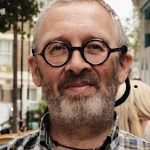A Further Lesson to be Learnt from the Russian Invasion of the Ukraine
by Andrew Brown
A perspective on the war in Ukraine was offered as a short “thought for the day” by Andrew Brown at the Cambridge (UK) Unitarian Church. This began by reading by reading the poem
“Past and Present” by the Slovenian poet, Boris A. Novak, and then continued to say . . .
Putin is today rending memories in a phenomenally deceitful and destructive fashion by violently brushing away everything that doesn’t fit perfectly with his own reassessments and reinterpretations.
However, lest we dangerously and hubristically deceive ourselves, it’s vital to realise that, to a greater or lesser extent, and whether as individuals or nations, we all do this kind of thing on a daily basis because that is how human beings have always lived and worked with their past to make their present.
Novak sees that in all cases, whether in honest or deceitful, constructive or destructive ways:
The past is ever changing,
shaded in by memory’s brush,
But, as Novak then immediately makes clear:
. . . future’s sky is clear.
It can’t be rearranged.
Completely mine and fresh,
it closes overhead, an empty chamber.
The message of hope we need to hear clearly in these very dark days is this truth, that the future is no one’s. It always-already remains an empty chamber, blank, strange and mysterious.
Even if Putin were to “win” this conflict — whatever “win” means in this context — the future would still not be his. A better world than the one Putin offers is always possible. But, but, but we must remember that the future is not ours either — it really is no one’s. All we ever have to work with is the past and the present.
As Jesus once wisely advised, we must not, nor indeed can, worry about tomorrow, for tomorrow will worry about itself and that, therefore, the task is always and only to strive first for the kingdom of God and God’s righteousness (Matthew 6:33). Which, being colloquially interpreted, is simply to heed the call “to love the hell out of this world” in each and every one of our acts.
Andrew Brown is minister of the Cambridge (UK) Unitarian Church. This and additional postings can be seen at his blog, Caute – Making Footprints Not Blueprints.

